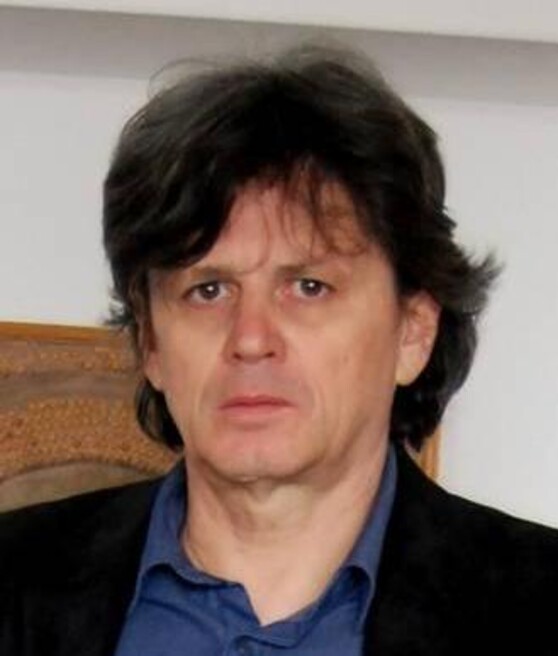Catalin Mihuleac
area: Literature
Key Facts
nationality
Romaniaarea
Literatureresidence
Iasirecommending institution
BMeiAtime period
November 2012 - November 2012Academic Degrees
PhD in Philology at “Al. I. Cuza” University in Iaşi, with the doctoral thesis Pamfletul şi tableta. Jurnalism sau literatură ? (Pamphlet and Editorial. Journalism or Literature ?), published at “Al. I. Cuza” University Publishing House, Iaşi, 2009
Short Stories
Garsonieră memorială confort trei (Memorial Studio Apartment), Bucharest, “Maşina de scris” Publishing House, 1996; second edition, Iaşi, “Timpul” Publishing House, 2006;
Titlu neprecizat (Unspecified Title), Iaşi, “Polirom” Publishing House, 1999;
Noapte bună, tâmpitule ! (Good Night, You Fool !), Iaşi, “Cronica” Publishing House, 2003;
Ratarea unui setter (The Failure of a Setter), Iaşi, “Polirom” Publishing House, 2004
Zece povestiri multilateral dezvoltate (Ten Multilaterally Developed Stories), Bucharest, “Cartea Românească” Publishing House, 2010
Constant presence in the anthologies Best Short Stories of the Year
Novels
Dispariţia oraşului Iaşi (The Disappearance of the City of Iasi), Iaşi, “Institutul european” Publishing House, 1998; second edition, Iaşi, “Timpul” Publishing House, 2007;
Aventurile unui gentleman bolşevic (The Adventures of a Bolshevik Gentleman) – in course of issue in Bucharest, “Cartea Românească” Publishing House
Drama
Volumes
Patru piese de tranziţie (Four Transition Plays), Iaşi, “Princeps Edit” Publishing House, 2003;
Antologia dramatIS (DramatIS Anthology), co-author, with Dan Lungu and Dan-Lucian Teodorovici, Bucharest, “Cartea românească” Publishing House, 2008;
Stage Plays
Hai, Vasile, să-l cărăm la crematoriu pe nenorocitul ăsta! (Come
On, Vasile, Let's Carry this Wretch to the Crematorium!), directed by Ovidiu Lazăr, Iaşi, “Vasile Alecsandri” National Theater, 2002-2003;
Şapte deriziuni (Seven Derisions), directed by Bogdan Ulmu, Iaşi, “Luceafărul” Theater, 2003;
Devoratoarea de litere (The Girl Who Devours Letters), directed by Horaţiu Mihaiu, Sfântu Gheorghe, “Andrei Mureşanu” Theater, 2004-2007;
Marfa din supermarket (The Supermarket Goods), directed by Attila Vizauer, Bucharest, “Radio România Actualităţi”, 2007-2009;
Artă şi seminţe prăjite (Art and Roasted Sunflower Seeds), directed by Lenuş Teodora Moraru, Botoşani, “Mihai Eminescu” Theater, 2012- present
Member of the “Writers’ Union” of Romania
Report regarding the residence offered by Museums Quartier
I used the opportunity of being in Vienna, in November 2012, for the purpose of documenting a novel I am currently working at. The notes I took in Vienna are the most useful at the moment.
The main character of the novel is a Jewish woman, born in Iasi, Romania. She survived the first pogrom of World War II, in which she lost her father and brother. At that time, she was 11.
In 1940, 50,000 Jewish people were living in Iasi, which represented half of the entire population of the city. Given that Romania had become Germany’s ally, it was here that the first war pogrom took place, as a result of which approximately 15,000 Jewish people were killed with an indescribable cruelty. It was only in the recent years that the historians found out the real proportions of the massacre, since the communist regime hid them carefully, for half a century.
In only a few days - between June 29 and July 2, 1941 – a break out of hatred manifested both by the army and the police and by the civil Christian population, transformed the city into a blood bath. The expedite street executions, the trains of death where the prisoners were killed by suffocation, the robberies and rapes caused this apparently civilized city to go back in time by a few centuries. Basically, there was no Jewish family in Iasi who was not mournful, after those days of extreme cruelty.
In the autumn of 1947, the communist regime was already established in Romania, which determined a radical turning point in the life of the adolescent heroine of the novel. Through the human traffic networks which already existed, she escapes Romania and goes abroad. She arrives in Vienna, in November 1947, from where, with the support from the association Joint Distribution Committee, manages to leave to the United States of America.
The months spent in Rotschild Hospital – transformed into a shelter for Jewish refugees and occupied mainly by Romanians, in the autumn of 1947 – left a mark on her for the rest of her life. To her, Vienna remains the place of a new beginning. A capital of hope, where the traumatizing memories start to fade and give place to optimism.
This is the reason why the character – who became a rich business woman in Washington DC, having, however, the disadvantages of the advanced age, such as illness, widowhood and loneliness – returns to Vienna in 2012, to regain her memories.
The novel is about the reconciliation with the past, but, first of all, about the reconciliation with oneself. The book contains many surprises, and the story is conveyed by two distinctive narrative voices.
